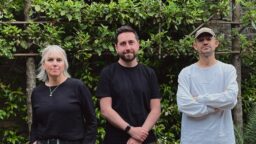Most of us muddle along in the early days of our careers without having to think about impressing a global superstar. Not Abi Leland.
The highly respected music supervisor got her first job in the field, aged 20, working with none other than Sir Elton John and his partner David Furnish.
The film was Women Talking Dirty, produced by Rocket Pictures and released in 2001. Leland had no experience, but went in armed with passion, chutzpah, and a hunger to learn.
“When I found out there was a job as a music supervisor, I knew that’s what I wanted to do,” she says.
“I printed out business cards with ‘music supervisor’ as my job title, went off and found as many leads as I could, went to some quite strange seminars loosely based around the subject of sound and music for visual media, and met people working in labels and film producers to ask questions and find out about it.”
“When I found out there was a job as a music supervisor, I printed out business cards, went off and found as many leads as I could.”
One of those people was film composer Simon Boswell, who was working on Women Talking Dirty and recommended that she get involved.
Leland remembers: “I didn’t know how to do the job, but I was quite up for winging it and I’ve always been good at asking questions and learning on the go.”
With help from ex business partner Dan Rose, who brought the necessary licensing expertise, Leland was soon working out of Elton John’s office and doing the music for his first feature film. She was officially a self-ordained, professional music supervisor.
Aside from one surreal phone call with Elton, Leland mostly worked alongside Furnish. “He was great and lovely,” she says.
“Looking back on it now, he was really quite patient as well. I was 20 years old, it was my first job, but I’m sure that whatever knowledge I might have lacked I probably compensated in enthusiasm and dedication! It was a good experience.”
The blagging paid off big time – cut to 2018 and Leland is now head of one of the UK’s most respected music supervision agencies, Leland Music.
Since launching in 2005, the company, which works across film, advertising and TV, has helped create ad campaigns and music partnerships for brands including Nike, Honda, Sony, Hovis, Lloyds TSB and Three Mobile, and feature films such as Kevin Macdonald’s Last King of Scotland and How I Live Now.
It’s also a regular partner of retail firm John Lewis, and has helped choose and create the music for the brand’s highly-anticipated Christmas TV ads.
Thanks in part to the creative nous of Leland and team, those campaigns have spawned four UK Top 10 hits, including two No.1s, and helped launch the careers of Ellie Goulding, Tom Odell, Gabrielle Aplin and Aurora with emotive cover versions of notable songs.
While it took Leland a while to discover music supervision, a career in music and film was perhaps destined from the start.
Leland’s dad, David Leland, is a successful film director; she spent every summer at Glastonbury from the age of five where her mum ran the kids’ area. (Leland actually learnt to drive on Worthy Farm, practicing sharp left turns by the Pyramid Stage weeks before she crowds descended).
As a free spirit who wasn’t keen on the institution of school, Leland dropped out of her A Levels to work as a runner for Sarah Radclyffe Productions, with the ambition of becoming a film producer.
After making lots of tea and coffee, and literally running around the streets of Soho delivering and receiving packages, Leland quit for a second time to spend a few years partying at techno festivals across Europe.
Eventually, as we all do, she realised raving just wasn’t going to pay the bills. So she returned to London as a runner again, before joining dance music compilation label Millennium Records in ’97.
Starting as office manager, she was soon putting together compilations herself, which opened the door to the record label and licensing world.
A stint at vinyl collectors label Simply Vinyl followed, which was where Leland was introduced to film music.
She recalls: “They were releasing a lot of old classics, soundtracks for films like Easy Rider and Taxi Driver, and Lalo Schifrin and John Barry scores.
“I’d worked in film, then I was working in music, so started to join the dots and wonder if there was a job in all of this. I asked around and eventually found the title music supervisor.”
Discussing the early years of her career and learning on the job, Leland says: “On a creative level, I absolutely loved it and music research came quite naturally. Music researching at that time was quite different to today but I still try and approach it in a similar way.
“When I first started there wasn’t an online resource so I was heavily reliant on relationships with music publishers, labels, managers, record shops and books, and spent half my time going from label to publisher, listening to music and coming away with bags and bags of CDs.”
Women Talking Dirty opened more doors and Leland and Rose worked together for three years, becoming the de facto music supervisors for early 2000s independent and mid-budget UK films.
These included Intermission, There is Only One Jimmy Grimble, Born Romantic and Enigma. The biggest lesson Leland learned during this period was simply the importance of asking questions.
“I was never afraid to ask questions, put my hand up and say I don’t understand, who, what or how? I felt I was totally valid to do that.”
“I was never afraid to ask questions, put my hand up and say I don’t understand, who, what or how? I felt I was totally valid to do that,” she says.
“It’s almost harder to do that now, you feel that at a certain age and level of experience, you should know all the answers to everything. But I think you have to really fight against that idea because otherwise you stop learning.”
Financial strains and a conflicting ethos led to Leland parting ways with Rose, but she continued to work alone on projects including Touching the Void with director Kevin MacDonald.
After again growing frustrated with the lack of money available in films for a music supervisor at the time, Leland started to look for opportunities in advertising.
While knocking on doors, she met British composer Pete Raeburn who gave her a job at his own Soundtree Music company, which provided the education and entry into the ad industry she needed.
After working on high profile campaigns, including Levis and Playstation, Leland was ready to venture out alone again and that’s when Leland Music was born.
Six years ago she decided to build a team and the company now has a staff of seven. The decision to grow beyond herself was a tricky one to get her head around at the time, but Leland hasn’t looked back.
She explains: “Like an editor, a music supervisor is ‘that person who does that job’ and at first I couldn’t understand how to allow other people to take on responsibility. I was turning down work that I wanted to do but couldn’t on my own.
“Thankfully, I really took to being a business owner and managing people. It became very exciting that it wasn’t just me; I was growing a business, and I still find that really exciting.”
Leland offers some advice for those wanting to take a similar entrepreneurial path: “For anyone looking to start a business, my main advice is that you’ve got to want to have employees and care about their development and careers.
“For anyone looking to start a business, my main advice is that you’ve got to want to have employees and care about their development and careers.”
“You’ve got to want to think about how your business runs and functions internally, but also within the industry. If you just want to do your job, don’t run a business, be a freelancer.”
One of Leland Music’s most high profile jobs has been the John Lewis Christmas ad campaign, which the company has worked on every year since the first one in 2009, alongside agency Adam & EveDDB.

After resulting in multiple chart hits for songs written by John Lennon, Keane, Elton John and Frankie Goes to Hollywood, the campaign is now a highly coveted promotional slot for artists.
Its most notable successes include covers by Lily Allen, who hit No.1 in 2014, Ellie Goulding, who reached No.2 in 2010, and Gabrielle Aplin, who hit the top spot in 2012. Tom Odell peaked at No.7 in 2014.
“When Ellie Goulding went to No.2, the music industry started to sit up and take notice. We’ve just carried on approaching [john lewis] in the same way as we do with everything, which is to deliver the best creative.”

“When Ellie Goulding went to No.2, the music industry went, Oh wow, this ad has created a massive hit for what was at that point an emerging artist, so everyone started to sit up and take notice,” says Leland.
“We’ve just carried on approaching it in the same way as we do with everything, which is to deliver the best creative.
“Not to say we don’t deliver the best strategy and commercial aspect, of course you do, but none of that is going to work if you don’t have good creative in the first place. If that’s your first and foremost, everything else will fall into place.”
The success of the slot must result in a lot of pitches… “John Lewis has become more challenging every year as there is more pressure and it’s known as this commercial opportunity for artists, which has added a whole other dynamic,” Leland answers.
“There are a lot of relationships to manage around it! But I’m very transparent and pretty direct, which I think is the best way to work with people.”
While the chart hits have come as a welcome surprise, Leland is keen to emphasise her company’s priority on creative at the core and long-term thinking when matching music to picture.
“If an artist or a writer lands an ad it can make them a significant amount of money overnight and that is one the joys of sync. But at the same time, it’s not about overnight hits,” she explains.
“I love that sync is open to everyone, you’re not just looking for the big and the famous. I’ve licensed everything from the most obscure track from various territories that no-one has ever heard, to massive hits by the Beatles and the Rolling Stones.
“It’s very varied and not exclusive so you have to approach it like that when you’re looking. Sync is not about trends either. People ask, ‘What are the trends in music and sync at the moment?’ Lots of people will come up with answers but I really don’t believe it works in that way.
“If labels and publishers suddenly starting signing ‘sync friendly’ artists and writers, what does that mean? Artist development is just about having belief in the music, working long term and working sync in as part of that.”
“If labels and publishers suddenly starting signing ‘sync friendly’ artists and writers, what does that mean? Artist development is just about having belief in the music, working long term and working sync in as part of that.”
While the music industry has been getting to grips with streaming and a subscription model, so has the film and TV worlds, and advertising is facing its own challenges in the digital era. That’s resulted in a shift in where Leland Music gets most of its business, which is now leaning more towards film and TV as well as advertising.
“Streaming has been fantastic because creatively it’s opening up so many more opportunities in the UK,” Leland says. “From a music aspect, the opportunities for music supervisors and composers are far greater.”
As with any change, there are some challenges to overcome in this new world order, most pertinently in the amount of value being placed on music. Leland explains: “What I see happen quite a bit in the sync industry now is the value of music being driven down.
“While the approach of trying to hustle and drive everyone’s fees down might make money for companies in the short term, it’s not good for the health of the industry long term and is a really irresponsible position to take.
“music budgets are shrinking across the board, and whilst there is always a solution for every budget restraint, it’s not necessarily going to bring the greatest creative solution.”
“The music budget needs to reflect the production budget of whatever you’re working on, whether that’s a film, Netflix series, online commercial or massive global TV commercial.
“Not everything can be the ideal scenario, but music budgets are shrinking across the board, and whilst there is always a solution for every budget restraint, it’s not necessarily going to bring the greatest creative solution.”
Leland fights against the trend of dwindling budgets with transparency, communication and education. She adds: “You have to have those conversations constantly, ‘You’ve got a budget of this but you’ve allocated this over here and you’re restricting yourself.’ Everyone needs to do that.
“People have to be aware of the compromises that are made. We need to make sure that with all these greater creative opportunities, they still manage to be financially viable and sustainable for composers and the music industry.”
Developing composers is now part of Leland’s business through sister agency Leland Originals, which launched in 2016; it represents Michael Russoff, Tom Hodge and Donna McKevitt. It also focuses on new talent from diverse backgrounds.
The idea was inspired by the potential of some of the lesser-known composers Leland has discovered during her career, who were lacking the representation they wanted.
“A lot of agents won’t necessarily sign a composer until they’ve got a stream of credits, whereas we’re working from the other way, finding people that we think are really interesting at whatever stage they are at and developing them,” she says.
“We are constantly looking at what their goals and aspirations are and figuring out the best way to get there. We’ve got grand ideas and there are big challenges but I really do believe in it and I’m really enjoying it.”
Finally, after working with Elton John, launching and growing her own company, and securing work with some of the biggest brands around, does Leland have any other ambitions on her bucket list?
“In terms of where I want to get to, it’s just the cliche of being very good at what you do,” she concludes.
“I don’t have ambitions to be the biggest but I want to be the best and most respected at doing things in a unique way.”
“With the music supervision company and the composer management arm, if I was to compare where I want to get to within the music industry, I’d want to be like XL Records because they do things exactly how they want to, have complete belief in the artists they sign, and have a really good moral standpoint in terms of how they work with artists and industry.
“That is what I aim to do. I don’t have ambitions to be the biggest but I want to be the best and most respected at doing things in a unique way.”

MBUK is available via an annual subscription through here.
All physical subscribers will receive a complimentary digital edition with each issue.Music Business Worldwide




